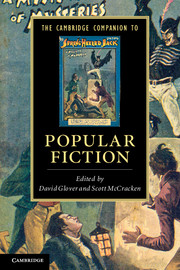Book contents
- Frontmatter
- Introduction
- 1 Publishing, history, genre
- 2 Fiction, theatre and early cinema
- 3 Television and serial fictions
- 4 The public sphere, popular culture and the true meaning of the zombie apocalypse
- 5 The reader of popular fiction
- 6 Reading time: popular fiction and the everyday
- 7 Gender and sexuality in popular fiction
- 8 Pulp sensations
- 9 Bestselling fiction: machinery, economy, excess
- 10 Comic books and graphic novels
- 11 Popular fiction in the digital age
- Further reading
- Index
- Cambridge Companions to …
7 - Gender and sexuality in popular fiction
Published online by Cambridge University Press: 28 May 2012
- Frontmatter
- Introduction
- 1 Publishing, history, genre
- 2 Fiction, theatre and early cinema
- 3 Television and serial fictions
- 4 The public sphere, popular culture and the true meaning of the zombie apocalypse
- 5 The reader of popular fiction
- 6 Reading time: popular fiction and the everyday
- 7 Gender and sexuality in popular fiction
- 8 Pulp sensations
- 9 Bestselling fiction: machinery, economy, excess
- 10 Comic books and graphic novels
- 11 Popular fiction in the digital age
- Further reading
- Index
- Cambridge Companions to …
Summary
Introduction: gender and sexuality in the field of popular fiction
Popular fiction has always had an intricate connection with questions of gender and sexuality. In order to attend to this connection, it is necessary to consider not only the content of popular fiction (its representations of women and men and of sexual relationships and behaviour, for example), but also its motivations and effects, the readerships it constructs for itself, the reading practices and communities it institutes, the critical responses to it, the gendering of particular genres (and of popular culture itself), and the material contexts of the production and consumption of the popular. Although there are many texts and topics that could be covered in an essay such as this one, my necessarily selective focus here will range across: theories of reading and the perceived effects of popular fiction upon women readers in particular; the complex ideological work of popular fiction in constructing our conceptions (and, therefore, shaping our lived experience) of masculinity, femininity, heterosexuality and homosexuality; the appropriation and subversion of popular genres for new or alternative ideological ends (for example, in 1970s feminist science fiction, and 1950s lesbian pulp); the popular response to, and elucidation of post-feminism through chick lit (viewed as a development of contemporary romance fiction) from the 1990s onwards; and recent developments in the dissemination of popular narratives of gender and sexual identity and practice due to new technologies (e.g. internet blogs about female sexuality), which suggest that in any consideration of popular writing we must continue to attend to the shifting modes of production, distribution and consumption which put these texts into circulation and partly determine their effects for us.
- Type
- Chapter
- Information
- The Cambridge Companion to Popular Fiction , pp. 122 - 140Publisher: Cambridge University PressPrint publication year: 2012
- 5
- Cited by



